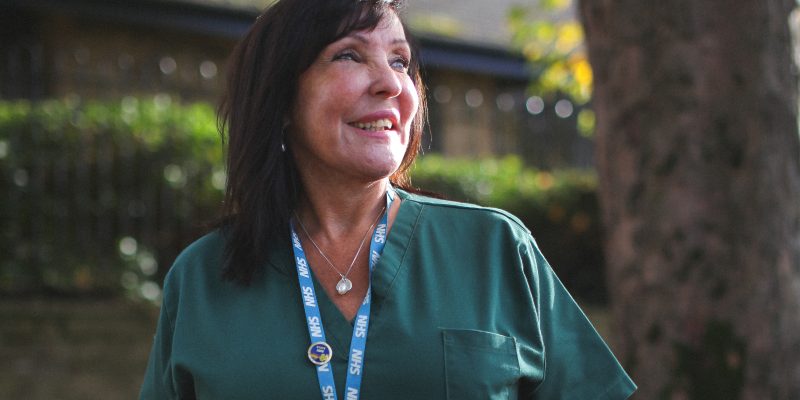As the UK’s leading inclusion health charity, our purpose is to improve the health and wellbeing of people experiencing homelessness and other vulnerable groups. That’s why we work closely with the NHS and other partners to create improved models of care for these people.
We strive every day for better and more equitable health and wellbeing for all patients. Inclusion health matters because homelessness is a health issue – wider social determinants impact health, not just on individuals, but the whole of society.
Our model of a multi-disciplinary team uses the opportunity of a hospital admission to enable people experiencing multiple exclusion to move onto a more positive life path.
We work to improve the quality of healthcare homeless and excluded patients receive by:
- developing and sharing best models of care like our hospital teams;
- increasing specialist skills of workers in healthcare;
- influencing policy; and
- reducing stigma in healthcare against people experiencing multiple exclusion.
Pathway has helped 11 hospitals in the UK to create teams of doctors, nurses, social care professionals and peer supporters. These teams support over 3500 homeless patients every year. However, many more people need our help. Over the next five years, we plan to extend our network of teams and share the Pathway model more widely. The aim is to improve outcomes for homeless patients and help reduce health inequalities.
The NHS Long Term Plan calls for stronger NHS action on health inequalities, and a concerted and systematic approach to addressing unwarranted variation in care. The Plan commits the NHS to continuing to commission, partner with and support charities, social enterprises and community interest companies providing services and support to vulnerable and at-risk groups. In particular, it commits to extra funding to meet the needs of rough sleepers and notes that people affected by homelessness die, on average, around 30 years earlier than the general population.
The Pathway Board of Trustees, staff, associates and teams across the country are committed to addressing the unique challenges of those experiencing homelessness and other forms of deep social exclusion.
Since our inception, we’ve made significant strides in pioneering the field of inclusion health, just as the challenges have intensified with factors like Brexit, the COVID-19 pandemic, and economic instability exacerbating social exclusion and homelessness.
We’ve contributed to deeper clinical insights into the consequences of social exclusion and the causes of ‘tri-morbidity’ (physical ill health, mental ill health, substance misuse). The Faculty for Homeless and Inclusion Health serves as a platform for collaboration, knowledge exchange, and innovation. Pathway developed the first-ever standards for homeless and inclusion health, providing a framework for improving healthcare. We’ve successfully shared our model with hospitals and established the Pathway Partnership Programme, expanding our impact. Through research and showcasing effective models, we’ve influenced policy and promoted good clinical practice. You can learn more in our annual report section here.
However, despite progress, inclusion health remains a niche field, often struggling to generate political traction and prioritisation in political agendas. Services for marginalised populations still have little statutory protection, and while the development of the NICE homelessness guidelines is a win, systemic change is still required for effective implementation. Though very highly regarded, the evidence base for inclusion health requires ongoing updates to address current challenges.
There are nevertheless opportunities for growth. Partnerships offer opportunities to adapt and flex inclusion health models to different contexts, and our partnership with Crisis offers us greater security and scope to explore different ways of bringing about change. Our Experts by Experience programme remains a core part of our work, ensuring the voices of those with lived experience are empowered to co-create innovative solutions and participate in decision-making processes.
Moving forward, we continue to be guided by our belief in the inverse care law, which holds that those in greatest need of care are often the least likely to receive it. To challenge this system, we support the Marmot principles, we advocate for health equity and social justice, we stand by trauma-informed care models, and we work tirelessly to address the root causes of health inequities. We also support the wider inclusion health agenda through our Fellows, the Faculty for Homeless and Inclusion Health, and our annual conference.
Our current strategic priorities include:
- Prevention through primary care: We want a world where people who are homeless are prevented from experiencing poorer healthcare through access to high quality GP services.
- Improving hospital care: Driving up the standards of healthcare in hospitals for people facing homelessness, so that they receive the care they need and each admission is an opportunity for change.
- A safe recovery for all: Addressing the shortfall in safe intermediate care where people can recover from illness and be helped to find long term accommodation and be connected to services.
- Raising the priority of homeless and inclusion health: This is our cross-cutting aim to draw attention to the deep injustice in our health and care system, and to build support and knowledge to tackle it.
